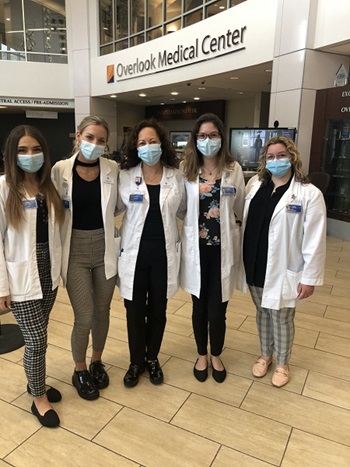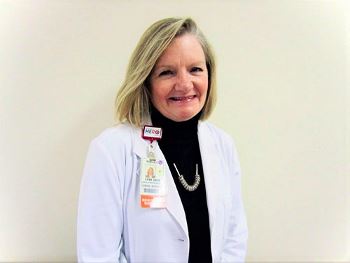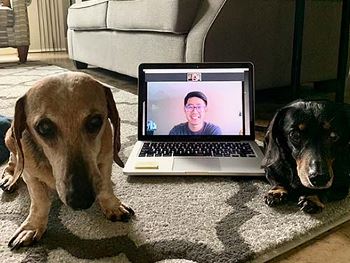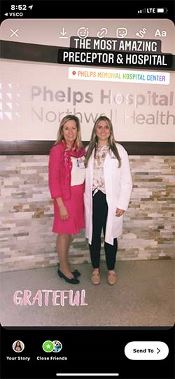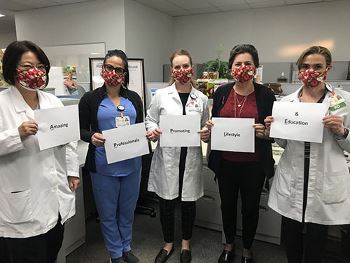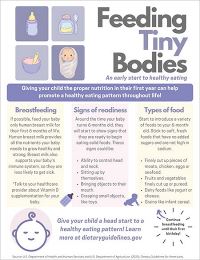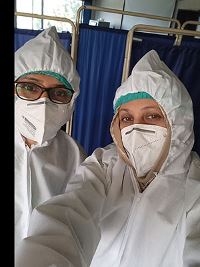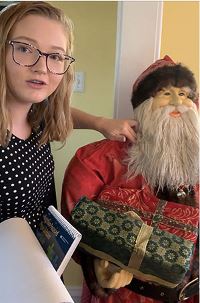Precepting During the Pandemic: Your Stories
Over the last year, the COVID-19 pandemic has presented unprecedented challenges for food and nutrition practitioners, including preceptors. We want to hear your story.
Wynnifred Hoodis, MS, RDN
|
For the past 3 years I worked as clinical faculty preceptor for Saint Elizabeth University (New Jersey) dietetic internship program. This was a unique position as I was a full time clinical preceptor at Overlook hospital with my primary responsibility to train intern cohorts with hands-on practical experience. I coordinated our days with the CNM, lead RD and other RD staff. At the start of the pandemic all faculty and students were asked to leave the hospital. Our program transitioned to virtual learning. We made the pivot with case studies and Zoom classrooms. The intern schedule was completely interrupted. Our interns were allowed back into the hospital in September with some limitations. I was impressed with the flexibility that the interns brought to their clinical rotation. In some cases, this rotation was their only full in-person experience and some had to postpone their graduation in order to "hope" for in-person clinical time. There was an adjustment for all of us to wear PPE all day, how to handle completing NFPE and how to provide the best patient care prior to the initiation of Covid vaccinations. There was stress and concern as we all learned how to navigate safely in the hospital. The interns were able to work closely with staff RD and truly learn what it takes to work in an acute care setting. I was impressed with the team work, handling of ups and downs and perseverance of the interns to get everything they could out of the experience with the constant pressure that at any moment we would be asked to leave the hospital again. |
|
|
Lynn Eden, MS, RD
|
The pandemic has presented many challenges as a preceptor. The new precautions/regulations made by the hospital to keep employees and patients safe were challenging for students to even be allowed in the building. Once interns were allowed, the fact that they were doing clinical rotations online prior to being allowed to come in person was a challenge for them — and us as preceptors. The knowledge base for clinical skills was somewhat lacking due to the inability to experience in-person what is needed to complete competencies. As preceptors, it was felt that we had to teach some basic skills that should have been known but were forgotten related to the COVID-19 effects on the structure of education of the interns. |
|
Lynn Eden, MS, RD |
There is also the fear factor — the overwhelming reality of how sick the COVID-19 patients are. When interns experienced it in-person on rounds in the ICU, it required some emotional support. It is difficult to teach critical thinking skills online, and it is much better for the interns to learn in-person.
As a preceptor committed to students and interns, there are concerns about the preparation of the interns for the RDN Exam as a result of COVID-19 effects on their education and experiences.
Avalon Mustafa, MS, RDN, LDN
This last year has been tough, real tough. Precepting was a way for me to focus on something other than COVID-19 and continue to develop myself professionally while thinking positively for the future of the students I was precepting.
In the past year, I had the privilege of precepting 48 dietetic interns from several internships. My little in Chicagoland LTC has a shorter rotation that lasts only one to four weeks. I ended up taking up to four or five interns at a time, due solely to sites losing the ability to precept and the interns having no other clinical options. The challenge of securing rotation sites fell hard on the shoulders of program directors. The perseverance shown by these individuals is admirable, and they should all be commended for their dedication to their students and work.
In May 2020, I created a four-week remote program with case studies, wellness projects, resident satisfaction activities and experiments with texture modification. My employer was able to use this curriculum to help other dietitians start precepting interns across the country. Luckily around August 2020, interns were able to start coming back onsite. The lessons I learned as a preceptor in the remote program made teaching in-person much more structured and organized.
So many stories have come from the last year. A set of interns was onsite when a tornado touched down just a mile from the community, but they jumped into action without hesitation to help calm the residents and bring them to safety. One intern sat with a resident for hours making conversation and providing comfort as the resident contemplated their last days on this earth. Several more developed and implemented a project that was set in motion pre-pandemic and we had no hope that it would ever get done; that project is complete, and the changes have improved our residents' lives in immeasurable ways. Every intern has contributed something of value to the lives of the residents here, and for that I'll be forever grateful. At times when I felt like Atlas trying to hold up the world (of nutrition), my interns lent their strength and made light work of what seemed like an insurmountable circumstance.
Seeing them grow through this experience has been the greatest joy of my career. The appreciation, care and determination that my interns have shown has given me a more optimistic approach to the world that my pessimistic nature tends to miss. It has truly been the greatest pleasure to play a small part in this crazy journey for these amazing people.
Liz Kiertscher, MS, RD
I am a preceptor because I believe in giving back to our profession by guiding, encouraging and educating interns pursuing their credentialing. I personally gain so much from being a preceptor! I have an intern most weeks of the year. I get to meet so many different interns from different programs and backgrounds with different goals and ambitions. It is wonderful to see the diversity of interns coming into the field. They bring new and fresh ideas to my work and the field of dietetics. Working with interns has allowed me to grow as a dietitian.
When the pandemic hit last year, we had to pivot to virtual rotations within a day. I had about three in-person interns at the time and, even though it was stressful and unknown territory, we were able to transition their rotation to a virtual environment and complete all of their competencies. It took a while to get into the groove, but I was able to change my onboarding, resources and materials, as well as activities, to work in a virtual environment. The interns are still learning about corporate wellness and the feedback I have received from them has been positive. During this pandemic, it has been awesome to see the resilience of interns to adapt and make changes due to COVID-19. We are still working virtually with interns, and we have been able to successfully work with all the internship programs we normally do and give the interns a well-rounded experience.
Neva Cochran, MS, RDN, LD, FAND
|
Since 2003, I've been a preceptor to over 120 dietetic interns for a one-week nutrition communications rotation. Even before the pandemic forced us to work virtually, I precepted a few virtual interns remotely: two from the University of Connecticut worked with me in 2014 and 2016 at the request of the dietetics program director, my friend and incoming Academy President-elect Ellen Shanley, and an intern who was allergic to dogs (I have two) also worked from home. In addition, the interns who are with me in person work two of their five days remotely. |
|
Even before the pandemic, Neva Cochran precepted virtually, including this intern who is allergic to dogs. |
So when COVID-19 hit last March and we all began to quarantine, I was able to easily pivot my rotation from in-person to virtual. While I had several interns scheduled, the three programs I primarily work with all asked if I could take additional interns as some of their sites were unable to host interns at all. From March 2020 through March 2021, I precepted 13 interns virtually.
Precepting virtually is very similar to the way I work with interns in person. Each morning starts off with a video call — FaceTime, Zoom or Skype — to discuss my work and their assignments for the day. The interns write an article for a local magazine that I contribute a nutrition feature to monthly, create a one-to-two-minute video for my intern YouTube channel, read articles and watch videos and presentations related to media and communication, and participate in two mock television interviews. In addition, they join me on webinars I am presenting or watching and meetings or calls I am having as well as assist me with projects I am working on. I am always available during the day by email, text or phone call to answer questions. They have enjoyed the virtual experience. One thought there wouldn't be enough to do in a virtual rotation but was pleasantly surprised that the week was jam-packed with experiences for her to learn.
Mary Pat Hughes, MS, RD, CDN
|
My experience with Pace University dietetic intern Danielle Broder was a true pleasure from the first day in September until her final day. She was a delight and reminded me of why I became a dietitian. She was smart, hardworking, inquisitive and a joy on all levels. I front-loaded her hours due to her long commute and the thought that she may be restricted due to COVID-19. My background is very diverse, and I was able to connect Danielle with dietitians in the field of recipe development and private practice to widen her experience in the field of dietetics. At every opportunity to be exposed to something new, Danielle embraced the idea with a willingness to learn and contribute. One of her experiences resulted in an elective rotation in her program at Pace University. Danielle was a total bonus for the Phelps Northwell community and our bariatric program. She was amazing with the patients and it was so exciting to see her grow time after time. She was a blessing to me and a joy to see her blossom. Yes, it is work on our part but, it was worth it and clearly exciting to help shape the future of the field. |
Mary Pat Hughes, MS, RD, CDN, with Pace University dietetic intern Danielle Broder |
Ellen Bowser, MS, RDN, LDN, RN, FAND
My first concern was our interns' safety during the initial shutdown. I wanted to keep their anxiety as low as possible, as I knew they couldn't learn when they were worried about their and their family's health. We switched from in-person to Zoom calls in March 2020. We scheduled meetings each day, worked on case studies and discussed patients seen via telehealth. My interns did a great job searching new learning experiences and they shared their resources.
Debra Tindle, RD
|
My team and I have been dedicated to quality dietetic intern mentoring for over 20 years. This past year has been a true test of our flexibility and creativity with regards to mentoring during the COVID-19 pandemic. A majority of our rotations shifted to a virtual, electronic or phone mentoring system. Some of our usual rotation activities (bariatric surgical observations, Nutrition Focused Physical Exams, Motivational Interviewing) had to be modified using webinars and partner practicing in place of hands-on. And our community presentations changed to webinars. |
|
Fountain Valley Hospital RDN Team |
We were fortunate to have a supportive facility to allow some limited face-to-face intern mentoring for clinical and foodservice applications, including supervised practice using the electronic medical record for required competencies. This facilitated our interns to complete their case studies and their foodservice theme days, which encompass a significant part of their learning processes. Our facility also supported our creation of a video submission to ACEND in lieu of an onsite visit, due to COVID-19 concerns.
Our team continues to provide dietetic intern mentoring to promote the profession of dietetics and food administration and has great satisfaction with the interns' successful passage of the RDN Exam. It is exciting to see the prediction of the need for RDNs increasing as much as 8% over the next five to 10 years, and that we can contribute to a viable RDN source!
Lynette Maxey, CDE
First, I love being a preceptor! I am at a critical access hospital in Northern Rural Michigan. Last year, during the initial phases of the pandemic, I found that I really needed to get creative. I had a dietetic intern coming for her community nutrition rotation. The hospital system I work for had just decided there would be no community outreach for the foreseeable future. I came up with appropriate community-based educational sessions: I set up meetings, tours and experiences with a local farmer who supplies to Gerber to discuss pesticides and farming practices. Additionally, I set up a meeting and tour with a local Mennonite organic dairy farm (Cream Cup Dairy) that makes yogurt, ice cream, cheese and assorted milk. They use old-fashioned glass bottles, so we got to see how the 1950s bottle washer sanitized them. I also set up a meeting with our local state representative to discuss nutritional issues in Michigan. For the next round of community nutrition interns, I have lined up the same farmer to talk about how he tests the Brix level of apples and the storage process, along with the O2 controls. I have lined up another meeting with the state representative regarding licensure in Michigan. I have also lined up a tour of Moomers Homemade Ice Cream to see their process. We also will be live-streaming a plant-based cooking class. My dietetic interns have other assorted projects to ensure that they have a good understanding of what community nutrition entails and can be.
Jackie Walters, RD, LD
|
An exceptionally motivated and enthusiastic student was assigned to my program by the University of Kentucky, where I work in the USDA-funded SNAP-Ed and EFNEP programs. Working from home, with limited access to our office facilities, her experience was almost entirely virtual. We met at the office initially, socially distanced, to plan her strategy for meeting her competencies and to make sure she knew how to access the necessary online resources. After that, she participated in many Zoom meetings and contributed to several projects. In fact, she made substantial contributions to our program mission. She served on a team to design, create and implement Extension educational materials about the 2020-2025 Dietary Guidelines. She created social media posts that were shared on Extension pages statewide, resulting in a total reach of almost 7,500 in one month. She also provided an online training about the 2020-2025 Dietary Guidelines to more than 150 paraprofessionals and professionals. |
|
Example of flyer designed by this student in her community nutrition placement. |
As a result, one of the Extension agents requested her as a guest speaker for a virtual community event. She collaborated with another team member to deliver an online cooking presentation for people with disabilities. She served on a team that revised a long-standing Extension publication, requiring testing of recipes and meeting virtually to display and discuss results. During this time, our program engaged in a collaboration with Central Kentucky Community Action Council to provide nutrition information for food boxes to be distributed to families with children enrolled in Head Start programming. She designed flyers to be customized with contact information for each county Extension agency and arranged the distribution of materials on a weekly basis. The flyers were so appropriate and effective that local offices began requesting to use them. Flexibility, creativity, access to and willingness to learn virtual communication platforms and graphic design programs, enthusiasm, teamwork, and willingness to work a little longer all contributed to this intern's successful execution of this community nutrition placement. I honestly believe she got more from her experience than many students who enjoyed pre-pandemic placements.
Lorna D. Wyatt, MS, RD
At our LTC community, we continued to host two students during the beginning of the pandemic. One was a senior dietetics student whom we later went on to hire and the other was a junior student doing her LTC rotation. Luckily, our administrator chose to treat them as colleagues and just required them to be tested along with the staff per facility policy. Both students were eventually pulled out of our facility by the university.
Later and well into the pandemic, we hosted another junior student for her LTC rotation who was grateful to have the opportunity to see residents in person, something she had not had the opportunity to experience until she came to us. Happily, she was able to complete her rotation with us before our facility closed its SNF and LTC services.
I have always been happy to host dietetic students. Even though it is an investment of my time, I am happy to contribute to the future of our field and feel a personal reward seeing the students learn, progress and gain confidence.
Ayeza Umar
|
Amid the uncertainty and ambiguity, the last year was full of anxiety and agitation for all professions. Dietitians were no different and had to face many challenges, whether it was to meet the nutritional requirements of a COVID-19 patient or to mentor interns in a hospital setting. In the last 11 years of my clinical experience, it was the first time I thought of risking the lives of the students who joined the internship program. Initially, as per our hospital policy, we stopped induction of students in the internship program for the first six months after the COVID-19 pandemic began. But gradually, as we got access to PPEs, we gained confidence and started enrolling a limited number of students. |
|
Ayeza Umar with dietetic intern. |
I have trained 13 students in the last six months. In a country like Pakistan where there are limited resources in health care, it is challenging to train students and equip them with the latest evidence-based practice guidelines. I always appreciate my students who have been so brave to join the internship program during the pandemic and, at the same time, I am proud of myself to be able to continue this journey of passing on knowledge to the next generation. I hope my students will continue working hard and that the field of nutrition continues to flourish in Pakistan.
Kimberley Asman
I work as an in-store retail dietitian. During the pandemic, we successfully shifted all our offerings to virtual. This includes kids and adult cooking classes, nutrition workshops, store tours, consultations and community events such as scout troop cooking classes or library recipe demonstrations. As a preceptor, I have had to adapt to find ways for my dietetic interns to be able to work with me and gain useful experiences in the virtual setting. Some dietetic interns are partially in-person, while some are completely virtual. For all virtual events, my interns have been able to participate from their home.
An intern who was partially in person was able to get ingredients in store and cook along with me in classes, helping to lead recipes. For an intern who was fully virtual, it was more of a challenge to find ways for them to contribute without cooking during class, as I was unable to provide ingredients in store. This led to finding creative ways they could assist; they were able to find nutrition tips and information about each ingredient used and provide that information during class. Both experiences led to each intern learning useful skills, including how to lead a recipe or how to tailor nutrition tips and education to various age groups.
To ensure the intern and I are working together and accomplishing all needed competencies for their internship, I have had to stay highly organized in determining their projects, and communication became key. Because we are not always together, virtual video chats and email have become essential and have helped it to feel like we were working closely together. While being virtual has been a large change from having interns assist with events in person, it has led to excellent new learning experiences that have left them more prepared for working as a registered dietitian in a post-COVID world.
Eileen Cress, EdD, RDN, LDN
This past year was unprecedented in what the world was going through, but at our facility, James H. Quillen VA Medical Center, we were unwavering in our goal to provide the best possible internship experience despite the pandemic. To make this happen, our dynamic team of preceptors sprang into action and implemented numerous changes: They modified plans to provide telehealth appointments that the interns could link to from a different location; offered Healthy Teaching Kitchens from office and home locations via telehealth; and provided phone consult opportunities and video connect appointments, so our interns could gain experience providing MNT in different settings.
Our clinical preceptors went the extra mile to research and teach the interns about nutritional needs of COVID-19 patients. Additionally, our preceptors were able to provide guidance on how to complete parts of a NFPE via telehealth. It is possible and the interns were able to see that firsthand. Our team also provided the same quality foodservice management rotation as usual, where the interns communicated with their preceptor via TEAMS when unable to meet in person. In this rotation, the interns were able to provide two distinct and amazing theme meals: A Night in Paris and Medieval Times. Our patients had to be in lockdown for months, so these meals were very special to them, and they were thrilled about the theme decorations and menu items.
Our preceptors went above and beyond the call of duty to continue our level of training despite numerous challenges. As I walked away from the medieval-themed meal, a patient thanked me for guiding the interns and stated, "you made us feel like the kings and queens that we are." To me, that says it all. It was a very positive experience for the interns to learn what a difference our profession can make in the lives of others and to see how the technology of today can keep us in touch with patients at all times.
Ricci-Lee Hotz, MS, RDN
During the pandemic, we all have had to make adjustments in the ways we interact with our clients, getting comfortable working from home (if we are lucky enough to do so) and, of course, trying to figure out how to still provide intern rotation experiences that meet their needs while working virtually.
I have had three interns over the course of the pandemic, and it has been a great experience of learning and adapting. The interns joined me over Zoom, shadowing on client visits (with client permission), created video presentations and worked on online content, as well as learning techniques of running a practice and how you can adapt when services have to be offered virtually.
I have loved the open-mindedness of the interns I have worked with and feel they were still able to get much of the same experiences they would have been able to get in person from the comfort of their own homes. There are so many interns struggling to find rotations through the pandemic, and I really encourage those who would usually precept to be open to adapting to provide those opportunities to the individuals trying to get into our incredible field of dietetics.
Eileen Hoag, MS, RD
|
Who knew how much fun it could be to share experiences with one's intern during interesting times! My intern, Taylor Hoeg (incredibly similar name to mine and shared with her permission), provided diet counseling to my husband who was newly diagnosed with diabetes, much appreciated by him. We met across a large table at my home. She discovered a lot about many electronic medical records used in my consulting practice, and she taught this older dietitian a few tricks about browsers and cookies. When it came time for her to complete a supervised nutrition focused physical exam, my husband was away on a work trip and the cat was in hiding. We had one of those pandemic-provoked eureka moments — Santa to the rescue! My almost life size Santa was happy to be patted and prodded. I took a video to share with Taylor's instructor. She did a fine job, and I'm happy to say that Santa is eating well and feeling fine. |
|
Eileen Hoag's dietetic intern Taylor Hoeg (pictured) used a nearly life-size Santa to perform a supervised nutrition focused physical exam. |
Sara Griffin, MS, RDN, CNSC
Interns always keep me on my toes. However, the pandemic presented a new set of challenges to adapt to. Our March 2020 intern was pulled from her rotation early, which was especially disappointing because she was just days away from shadowing in the ICU. Knowing she would miss this valuable and often pivotal time of learning, I sent several resources and journal articles to her internship director, encouraging her and other students in her cohort to review the articles and reach out if I could be of assistance remotely. We were able to accept interns later in the year and coached them through "pandemic skills," such as motivational interviewing via phone and building rapport with a patient from six feet away, underneath a mask and face shield.
I was and continue to be impressed by the resilience of our interns and how quickly they are able to adapt to new situations. Completing an internship during a pandemic is challenging in many ways, but I am confident these experiences will make them excellent nutrition professionals.
Ujwala Kulkarni, MPH, RDN
I work for Urban League of Detroit & Southeastern Michigan WIC clinic as a dietitian and clinic supervisor. Virtually precepting dietetics students during the pandemic was a challenging experience for me. However, I am grateful for the technology including secure video meetings and phone appointments with our WIC clients, which made this experience equally effective and safe for all the students and preceptors. We learned that we could use this experience moving forward while precepting future dietetic interns.
Susan Push, RD
The COVID-19 pandemic provided me with a unique opportunity to become a preceptor in a non-traditional setting. Previously, I acted as a preceptor in a hospital setting. However, I have taken a bit of a nontraditional role in the field of nutrition informatics working with dining technology. When the pandemic hit last spring, students from the management company I work for were suddenly displaced from their internships. Some only had a handful of hours left to complete their internships and their directors were trying to find something appropriate to fill this void that could be done remotely. I felt that by offering to precept students and teach them aspects of a nontraditional part of nutrition and dietetics, it was a small way for me to contribute something during the pandemic.
Within about a week of volunteering to be a preceptor, I had my first set of students. The rotation lasted about two weeks for some students and three weeks for others, depending on how many hours were needed. I enlisted one of my co-workers to assist, and we precepted about eight students in the spring. A few things were easy to accomplish, since everything we were going to do was set up on existing technology; we had been using WebEx or Teams for quite a while, so my co-worker and I did not need to learn any new technology to present a lesson plan to the students. Challenges included developing a lesson plan that taught the students about nutrition informatics and dining technology but also met key indicators that satisfied the requirements of the internship; working with students who had computers that did not support some of the technology; and having tasks that might require two screens when the students only had one small laptop screen.
Despite the challenges, we were able to work with the students and teach them about steps of menu planning, figuring out which food items would be allowed on a specific diet, investigating ingredients for allergies, learning a little bit about HL7 interfaces, learning the benefits and pitfalls of dining technology. We received a lot of positive feedback from the students. At the beginning of the fall semester, we had a few students we precepted until they could find space in a more traditional setting. As things evolve, I hope I can continue to provide information to students about this type of role on a more permanent basis.
Nicole Brown, MS, RDN, LD
In 2018, a nutrition student who also is a military spouse reached out to ask about my career path as an RDN. We met at my home office and she stayed in touch. In 2019, she emailed me from El Salvador, where her husband was stationed, to ask if I could be her preceptor for her elective in private practice with a distance internship she was applying to. She continued to send updates and eventually, in 2020, she, her husband and their 4-year-old son moved to northern Virginia — then COVID-19 hit. It meant her rotation would be 100% virtual.
It worked out extremely well! She got set up in the basement of the building they lived in. Her husband was at grad school at Johns Hopkins, and we were able to set up her 100+ hour internship in a way that allowed their son to be with either parent as needed. We used Zoom and FaceTime. She created or contributed to several webinars (one on lactation and one on ordering from restaurants), which I was able to use with my clients (and she participated, too!). We have a special connection because my husband had been in the USAF for 30 years and I had lived the life she was going to: living in the States and abroad and basically having to restart my practice with each new location.
I am thrilled to have had the opportunity to be her preceptor and support her plans to become an RDN. She passed her exit exam from her internship with a 97% and is planning to take the RDN exam at the end of April. My intern volunteered to be on a student/intern committee I am chairing for VAND and was able to connect with so many RDNs on the annual meeting planning committee. I look forward to hearing how she does when she and her family move to Mexico City, where she will get established as an RDN!
Sangeeta Shrivastava, PhD, MS, RDN, FAND
I appreciate all my preceptors for their time when I needed it. Now, I am willing to precept students to the best of my ability. I had a DPD student who wanted to shadow me, but due to COVID-19, we couldn't do it in person. We set up Zoom calls, so we could understand each other well and meet the needs of the student. I made myself available via text and we worked closely. We both are satisfied with the outcome; however, if it had been in person, that would be best.
Find an ACEND-Accredited Program
ACEND has more than 600 accredited programs across the United States and select countries internationally, with in-person and online options. Use the search filters to find the program that fits your needs.

